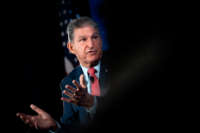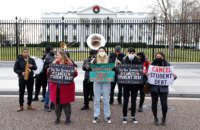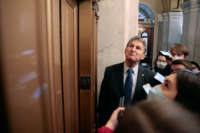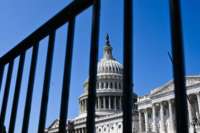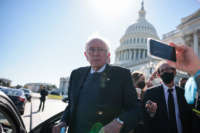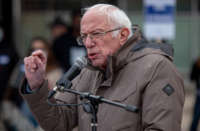
After the Biden administration announced on Wednesday that it is extending the federal student loan payment pause, progressive lawmakers are encouraging the president to take further action by cancelling student debt.
Debt advocates and lawmakers have been pressuring Joe Biden to follow through with his campaign promise to cancel up to $10,000 of student debt per borrower, some of them urging him to forgive student loans altogether. These calls were amplified after the administration announced that it would be extending the payment freeze for another 90 days, until May 1 – a decision that debt cancellation advocates say was largely influenced by public pressure.
Sen. Bernie Sanders (I-Vermont) praised the extension on Wednesday. “I applaud President Biden for once again pausing federal student loan payments for 45 million Americans,” he said. “Now let’s cancel it. All of it.”
The Vermont senator has long advocated for the cancellation of all federal student debt and included the measure in his platform during his 2020 presidential run. Sanders’s stance is more radical than that of other debt cancellation advocates like Sen. Elizabeth Warren (D-Massachusetts) and Senate Majority Leader Chuck Schumer (D-New York), who have urged Biden to cancel up to $50,000 in debt.
While this would eliminate all debts for a vast majority of borrowers, it would still leave many borrowers – often those with the most dire need for cancellation – with a large burden to bear. Roughly 6 percent of borrowers owe $100,000 or more in student loans, meaning that a plan to cancel about $50,000 in debt would still leave millions of borrowers with tens of thousands of dollars to pay off.
But either proposal would be more impactful than Biden’s promise to cancel up to $10,000 in debt per borrower – and also more impactful than cancelling no debt, which is what Biden has done so far.
Rep. Alexandria Ocasio-Cortez (D-New York) also celebrated the extension. “Thank you!” she wrote. “Next step: cancellation.”
“This is what happens when we all come together to raise our voices,” Rep. Cori Bush (D-Missouri) said, praising debt advocates for putting continued pressure on Biden. “Extending the student loan payment pause is a HUGE step forward that will help people get through this pandemic. Now let’s keep pushing until [Biden] cancels student loan debt.”
Warren, Schumer and Rep. Ayanna Pressley, who have been leading an ongoing effort to pressure Biden on loan forgiveness, issued a joint statement on the Biden administration’s decision. “Extending the pause will help millions of Americans make ends meet, especially as we overcome the Omicron variant,” they said. “We continue to call on President Biden to take executive action to cancel $50,000 in student debt, which will help close the racial wealth gap for borrowers and accelerate our economic recovery.”
Indeed, data finds that Black and other non-white borrowers have been disproportionately affected by the student loan crisis. The Brookings Institute found that the average white graduate owes $28,006 in student loans four years after graduation, while the average Black borrower owes $52,726 – nearly double that of white graduates. Debt cancellation could help close the racial wealth gap; a recent report from the Roosevelt Institute found that cancelling up to $50,000 per borrower could increase the wealth of Black Americans by a whopping 40 percent.
Financial assistance in the form of debt cancellation is especially urgent right now, as many families are about to lose a crucial safety net in the midst of yet another wave of the pandemic. The child tax credit program – which was expanded as part of the COVID stimulus packages – was crucial in reducing child poverty this year. But the last payment of the program went out recently, and thanks to Sen. Joe Manchin (D-West Virginia) and his staunch opposition to the program, poverty rates may go back up as the program expires.
Advocates say this makes debt cancellation all the more necessary, as it could help bolster the wealth of lower- and middle-income families as COVID continues to rock the economy. “The administration must now deliver on the President’s promise to cancel student debt, and lower costs for families at a time of tremendous health and economic uncertainty,” wrote the Congressional Progressive Caucus. “We need to continue our economic recovery and quest for racial justice.”
This post was originally published on Latest – Truthout.
